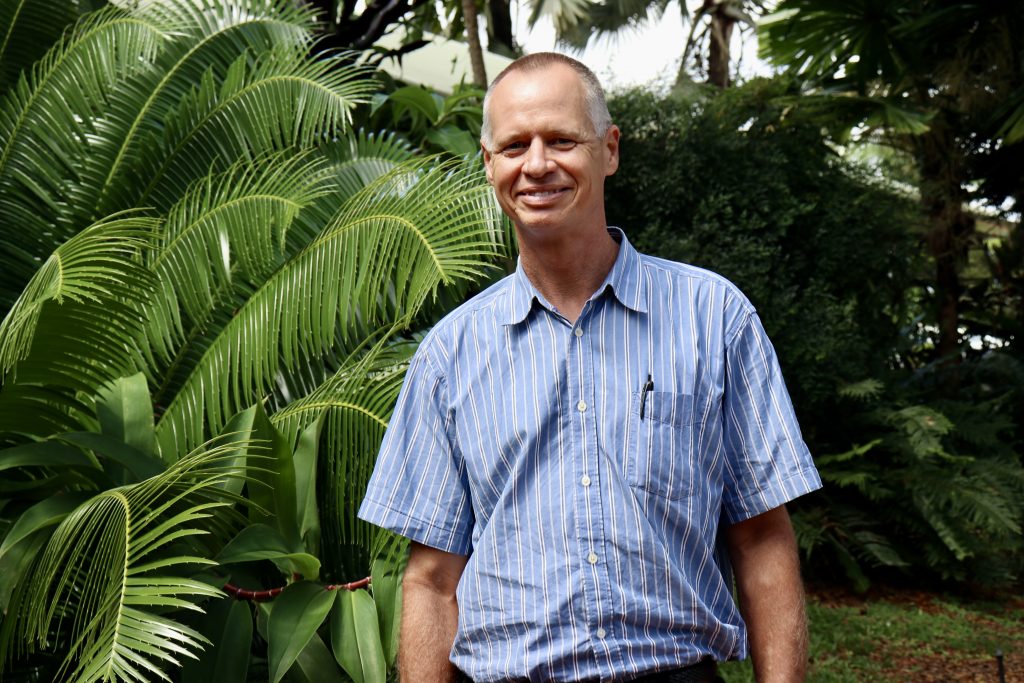Well-known soil biology expert, Dr Tony Pattison, was recently honoured for 25 years with the Department of Agriculture and Fisheries (DAF).
The globally-respected scientist, author and Principal Nemotologist took time to reflect on his milestone achievement of service, which he described as both fulfilling and challenging.
By Sonia Campbell
Making a difference to the livelihoods of Australian banana growers, has been the real mainstay for Principal Nemotologist, Dr Tony Pattison, who earlier this year celebrated 25 years of service at the DAF South Johnstone Research Facility.
The dedicated researcher is one of the most highly regarded soil ecology experts, both nationally and across the world.
In two and a half decades, he has pioneered a range of innovative technologies that have greatly assisted in the quantification of micro-organisms within soil that interact with horticultural crops.
His research has centred around developing sustainable cropping practices for banana growers that suppress disease – including Panama tropical race 4 – as well as managing plant-parasitic nematodes to reduce the use of chemicals.
A key component of this work in developing productive, disease suppressive banana soils is for growers to maintain the physical, chemical and biological health of soils, by building up biological diversity.
“I think some of the best aspects of being based somewhere like South Johnstone, is that you get constant interaction with banana growers, so you have to keep the research real,” Dr Pattison said.
“You are dealing with people’s livelihoods. So what you’re doing is overcoming real problems that affect the future of the industry and trying to produce better products.”
Dr Pattison’s career in agriculture began in his home town of Armidale, completing an undergraduate degree at the University of New England, which led to an interest in plant science and employment as a research assistant at the University of Sydney IA Watson Wheat Research Institute, in Narrabri, New South Wales.
“During this time plant-parasitic nematodes were becoming an increasing problem for wheat farmers in the region, and nematodes were more interesting than Fusarium (they moved and could be counted).
“While working I completed my M Sci Ag. on Pratylenchus thornei, then did a short stint with NSW Ag in cotton diseases, before being lured north in 1994 to work on nematodes in bananas (at South Johnstone).”
An initial 3-year contract turned into 25 years, and he’s still counting – despite having to make some initial major adjustments, both workwise and climatic.
“I had no experience in bananas whatsoever. And, I remember the year that I came up, it was the beginning of January 1994. It was a ‘dry spell’, and then we got Narrabri’s annual rainfall in three days, over the Australia Day long weekend. And, it didn’t stop raining. I asked people, “When is it going to stop raining?” to which one person replied, “I don’t know, I’ve only been here 5 years!”
Bananas being a global commodity, and afflicted by a myriad of pests and diseases, the industry has offered Dr Pattison many opportunities over the years to travel to tropical countries across the globe, including six-months spent in Costa Rica.
“During this period, I was part of the change away from widespread use of chemicals to control soil borne disease, to more ecological approaches through better soil management. I used nematodes as biological indicators and worked with banana growers to achieve practice change.
“Some of the work that I was doing in Costa Rica in 2007 was investigating soil health and suppression of nematodes. I was working with soil pH and ground covers’ impacts. Having ground covers on the soil surface is now standard practice in Costa Rican bananas.”
The initiative to improve soil health to manage soil borne diseases in bananas allowed Dr Pattison to join and lead projects funded by the Australian Centre for International Agricultural Research (ACIAR) in countries such as Indonesia, Philippines and Laos. It also allowed him to work with farmers in Costa Rica, Ecuador and Brazil.
“My career has now led full circle back to Fusarium. After having tried to escape from Fusarium when working in wheat, the work with Fusarium now offers new opportunities to work with banana farmers around the world to overcome Panama disease,” he said.
Dr Pattison said he was keen to keep working with the banana industry, which he believes will continue to evolve and see even greater practice change improvements over time.
“I think bananas are always challenging. You think you’ve worked it all out, but they (bananas) don’t follow the rules, it’s like a never ending puzzle. It just offers a lot of challenges to keep coming up with solutions.
“And technologies change so rapidly. Some things I’d loved to have done 10-15 years ago, I can do them now. Sequencing of DNA so you can see the genomes within the soil was unthinkable before.
But it is being able to take this new technology and apply it to help growers that gives me the most satisfaction.
“With nematodes, we don’t realise all the advances that we’ve made over time from the work that has been done. It’s only when you go to other countries and see how they produce bananas and you realise how our industry has evolved. And it will keep evolving.”

